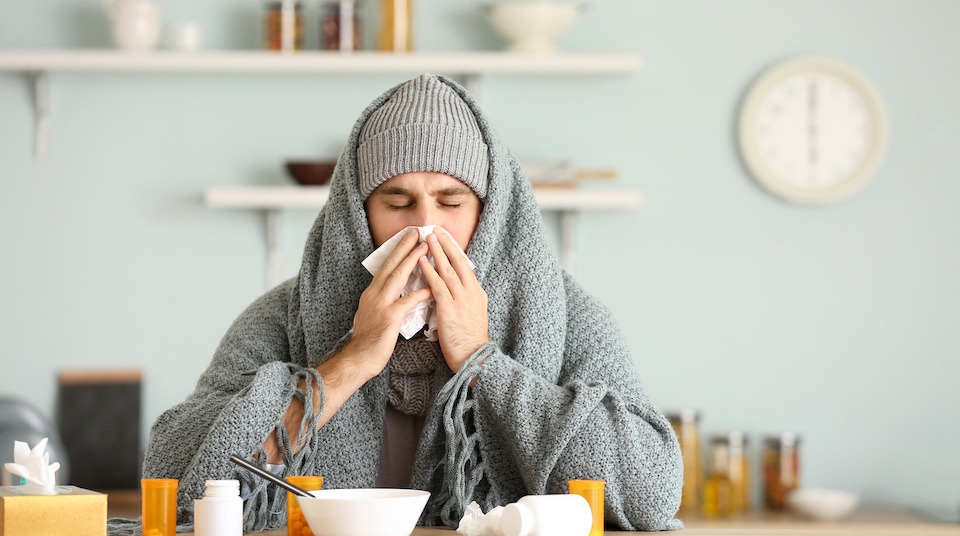This article might just save us 40 billion dollars. That’s how much Americans spend on cold medicine every year! That seems like a really high price tag, especially considering that these medications just mask the symptoms rather than treating the underlying cause of the illness. And, to make matters worse, OTC medicines are not without risk. This article by my UpWellness team will help you understand these OTC medications, the risks associated with them, and some natural alternatives.
Be Well
-Dr. Josh
The average American gets the cold or flu about 2-3 times each year, and 7 of 10 people with a cold turn to medication to keep them going. As you probably know already, there is no cure for the common cold. However, there are a variety of prescription and over-the-counter (OTC) pills, syrups, and suppressants that alleviate symptoms and make your sickness a little less miserable. But are these OTC options actually effective and healthy? Or is the medicine simply covering up the underlying issue and causing more harm than good? Read on to find out.
The truth behind cold medicine
Decongestant
If you are stuffy and struggling to breathe through your nose, it can be tempting to take a medicine with a decongestant to help get the excess mucous out and clear your nasal passageways. Some people take these drugs to help sleep, but unfortunately, they can often have the opposite effect, causing insomnia and anxiety, along with an increased heart rate and blood pressure.
Acetaminophen
Though you often think of Tylenol when you hear the word acetaminophen, this ingredient is common in a variety of OTC medications. Over 600 prescription and OTC medications, to be exact. Many people fail to check the ingredients of the drug they are taking and often don’t even realize that it contains acetaminophen. This ingredient is generally considered safe; however, taking too much can quickly become dangerous and could lead to acetaminophen-induced liver toxicity.
Ibuprofen
Studies have shown that high doses of NSAIDs may increase the risk of heart attack and other cardiovascular complications. Ibuprophen is especially dangerous, as it doubled the risk of a severe heart issue.
Sudafed (Pseudoephedrine)
Sudafed is found in many common over the counter medications to help relieve sinus pressure or nasal congestion. It has several side effects and may cause an excitable, hyperactive feeling and increase heart rate and blood pressure.
Diphenhydramine
Benadryl or diphenhydramine is an antihistamine and a non-benzodiazepine sedative-hypnotic. Studies have shown that regularly taking this medication may increase a person’s chances of developing dementia, cancer, and contribute to an early mortality rate.
Dextromethorphan
Dextromethorphan is a common cough suppressant found in many cold and flu medications and cough syrups. Overuse may lead to dependence, tolerance, and addiction, and it is a drug that puts you at risk of habit-formation and intoxication.
What to do
Though cold medicine may be helpful in certain circumstances, it certainly isn’t necessary. Your cold will go away on its own, and dousing yourself with various drugs won’t make it happen any quicker. Always read labels and be sure that you understand precisely what you are putting into your body. If you have a preexisting condition, or are already on prescription medication, talk with your doctor before taking anything new.
With that said, colds are no fun, and there’s no reason to stay miserable when there are great natural options available. Here are a few of our favorite safe and effective natural remedies to replace your dangerous cold medicine.
Honey
Here at UpWellness, we like to refer to honey as “liquid gold.” It simply is one of the most valuable and beneficial superfoods out there. It is antibacterial, loaded with antioxidants, and is an excellent way to relieve a cough and sore throat. Plus, it can help boost your immune system to fight off further colds! Simply take a teaspoon of honey before bed to help soothe irritated mucous membranes, quiet your cough and allow you to sleep through the night. Remember, do not give honey to children under 12 months.
Saltwater
Dissolve some sea salt in a glass of warm water and gargle with it to help alleviate many cold-related symptoms, including a sore throat. It can even help reduce the duration and severity of a cold. Do this at least twice a day for optimal results.
Sleep
Yes, sleep is a viable alternative to cold and flu medicine. Your body is capable of fighting off the infection on its own; however, you must support this battle by resting. Don’t try to push through a cold or flu and keep working as you normally would. Take a sick day and lay in bed watching movies and napping. Your body will thank you by recovering quicker.
Ginger
Pour boiling water over fresh sliced or grated ginger in your favorite mug and let it steep for five minutes. Strain and add a little raw honey and sip on this yummy, sinus-clearing tea. Ginger has potent immune-boosting capabilities and can bring down inflammation, clear congestion, and ease nausea if you have a stomach bug.
What are your favorite natural cold remedies? Let us know in the comments below!
-The UpWellness Team









